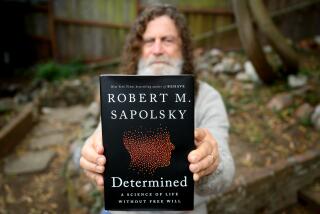Mark Rosenzweig dies at 86; UC Berkeley pioneer in brain plasticity research
- Share via
Mark Rosenzweig, a UC Berkeley psychologist who pioneered studies showing that the human brain can physically grow and change as we age, died July 20 in his home in Berkeley from kidney failure. He was 86.
The studies of Rosenzweig and his colleagues “continue to be cited in all current accounts of brain development and plasticity, though they were conducted half a century ago,” said Stephen Hinshaw, chairman of Berkeley’s department of psychology. “If anyone deserves the term ‘pioneer,’ he does.”
Researchers long thought that brain structure was “etched in stone,” fixed and unchangeable from birth. No one questioned that until psychologist Donald O. Hebb of McGill University in Montreal observed that rats allowed to run free in his home so that his children could play with them performed better on running mazes than did caged laboratory rats.
Intrigued, Rosenzweig, biochemist Ed Bennett and psychologist David Krech of Berkeley began raising rats in two types of cages -- an impoverished environment with small cages barren of mental and physical stimulation and an enriched environment with large cages and lots of toys, mazes and running wheels for the rats to play with. They found that the rats raised in the enriched environment performed better in tests of learning abilities than did those in the impoverished environment.
Dr. Marian Diamond, an anatomist, then joined the team and showed that the enriched environment produced distinctive physical changes in the rat brains.
In an extensive series of experiments through the 1950s and 1960s, the team also showed that the rats did not have to be infants to reap the benefits of an enriched environment. Middle-aged rodents responded nearly as well.
“Our first reports . . . were greeted with skepticism and incredulity,” Rosenzweig later wrote. Diamond recalled an elderly scientist rising after she presented some of her first results at a meeting, shouting “Young lady, the brain cannot change!”
But the idea began to gain acceptance as other researchers reproduced the team’s findings. Eventually, similar results were reported in children. Although the human brain loses much of its plasticity by the age of 10, an enriched environment can still prove beneficial in later years.
Mark Richard Rosenzweig was born in Rochester, N.Y. on Sept. 12, 1922, the son of Russian and Lithuanian Jews. He enrolled in the University of Rochester, earning a bachelor’s degree in psychology in 1943 and a master’s in 1944. He was then drafted into the Navy, serving at Anacostia Naval Base in Washington, D.C., where he was a radar technician. When President Franklin Roosevelt died, he marched in the funeral procession.
He later served on the seaplane tender Chincoteague, based in Tsingtao Harbor in China.
After the war, he enrolled in Harvard, where he received his doctorate in psychology in 1949. For his thesis research, he demonstrated that auditory connections from the ear to the brain could be monitored non-invasively with electrodes placed on the surface of the skull. Similar techniques are still used to test hearing in newborns.
Upon graduation, he took a position at Berkeley, where he remained for his career. He retired in 1991 but was rehired in 1994 as a professor of graduate studies.
His wife of 61 years, the former Janine Chappat, died last year. He is survived by two daughters, Anne Janine Rosenzweig of Morgan Hill, Calif., and Suzanne Jacqueline Washburn of Moraga, Calif.; a son, Philip Mark Rosenzweig of Sedbergh, England; a sister, Patty Epstein of Green Valley, Ariz.; six grandchildren; and two great-grandchildren.




